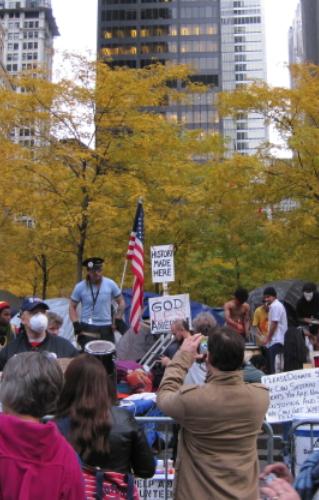I didn’t think I’d be viewing Occupy Wall St’s final hours when I ended up there by chance last Monday night, Nov 14. I’d spent the weekend in New York and thought I’d drop by Zuccotti Park on my last night in town to catch a moment in history.
Walking down Broadway I could hear the protest at least two blocks away, an accomplishment in the sonic frenzy that is lower Manhattan. The ramshackle arrangement of tents pushed against the police barricades set up around the park’s perimeter, a metaphor for the quiet tension between protesters and law enforcement. As long as you play by the rules you can have your fun, but step outside the lines and there will be trouble. Signs decorating the perimeter invoke the evils of capitalism, American imperialism, environmental destruction and student debt. “We don’t want a bigger slice — We need a different pie,” reads one draped over a tent.
The camp had a library, a vegan kitchen, a first-aid tent and a meditation circle. A list of rules posted at several places included a strict policy against drugs and alcohol. Judging by the scent of pot in the air, this item wasn’t being taken very seriously. A drum circle populated by bearded, dreadlocked, mostly shirtless guys, banged out noise that crashed against the surrounding offices. An anorexic-thin woman in a flowing skirt whirled barefoot to the beat, arms outstretched, head back, eyes closed.
“This is the worst of America on display,” one middle-aged onlooker muttered to his wife. Occasionally, civilians approached the barricades to talk to the protesters, both in solidarity and to argue. People were yelling constantly, sometimes through megaphones and sometimes in each other’s faces. But dialogue was happening.
There were more than 50 uniformed police and at least half as many squad cars, as well as two cameras on cranes slowly panning the action. The cops were generally jovial. They stood smiling with arms folded, chewing gum. Like everything else in New York, the event had become a tourist attraction, and people stopped by to snap photos as they would the Statue of Liberty or Times Square. But eventually police asked people to move along. When a towering hulk of an officer barked at me to move along, I asked him why. “Just because,” he snapped back.
I spoke with people and ate free food but mostly just stood silently trying to figure out what it all meant; 2011 year is shaping up to be another 1968, but what changes will we see in the long term? Is this the start of something greater or just another bump in the road of capitalism, relatively unfelt by those riding in luxury cars with computerized suspension? The next morning in the airport, CNN reported that protesters were evicted a few hours after I left. By the time I landed in Canada, the Toronto Occupy group had been given notice as well.
I sat and wondered if this was the beginning of the end of the movement. Had public support and political tolerance finally worn thin enough that things couldn’t last, at least not in the sense that they had? Will this be another blip on the radar of history, studied in the future as a pop cultural moment that did little to affect cultural discourse?
However, it seems people are not willing to give up so easily. In the days since the first evictions there have been marches, clashes with police and arrests. Maybe this isn’t the beginning of the end. Maybe it’s the end of the beginning.
If the last few days have been any indication, the next phase of this movement may look less like a marijuana drum circle and more like the Arab Spring. Already the government has employed violence and mass arrests to deal with protesters. According to CBS New York, journalists were kept at a distance during the raid, and a few, including some from the Associated Press and NPR were arrested, a move the NYPD said was for their own protection.
The message from both sides is clear: we are not afraid to get our hands dirty, and we will no longer be polite. The barricades have come down, but how the two sides will communicate without a wall between them is yet to be seen.


 Why you can trust Xtra
Why you can trust Xtra


